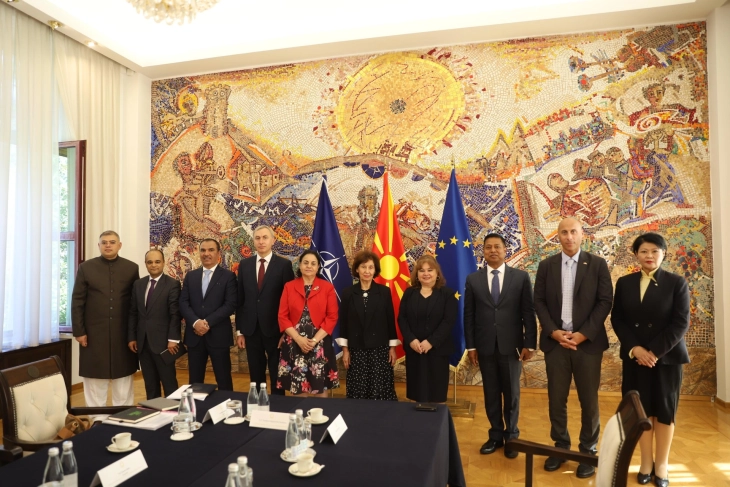President Siljanovska-Davkova meets non-resident ambassadors based in Sofia
- President Gordana Siljanovska-Davkova met Thursday with the non-resident ambassadors from the Kingdom of Morocco, Zakia El Midaoui; the Arab Republic of Egypt, Nader Saad; the State of Kuwait, Ghazi Hamed Alfadli; Mongolia, Sayanaa Lkhagvasuren; Georgia, Otar Berdzenishvili; the Republic of Moldova, Anatol Chebuk; the Republic of Cuba, Marieta Garcia Jordan; the Republic of India, Sanjay Rana; and the Islamic Republic of Pakistan, Modasar Chaudhary, who are based in Sofia.

Skopje, 12 September 2024 (MIA) - President Gordana Siljanovska-Davkova met Thursday with the non-resident ambassadors from the Kingdom of Morocco, Zakia El Midaoui; the Arab Republic of Egypt, Nader Saad; the State of Kuwait, Ghazi Hamed Alfadli; Mongolia, Sayanaa Lkhagvasuren; Georgia, Otar Berdzenishvili; the Republic of Moldova, Anatol Chebuk; the Republic of Cuba, Marieta Garcia Jordan; the Republic of India, Sanjay Rana; and the Islamic Republic of Pakistan, Modasar Chaudhary, who are based in Sofia.
During the meeting, President Siljanovska-Davkova underscored North Macedonia’s commitment to enhancing diplomatic relations with each of the countries, on both a bilateral and multilateral level.

“We are always open to dialogue, and we look forward to working closely with you to explore the full potential of our diplomatic and economic relations. I also hope that enhanced bilateral ties and important meetings will pave the way for opening your embassies here in Skopje,” President Siljanovska-Davkova said, according to her office’s press release.
She noted the vast potential for economic development, highlighting the country’s attractive investment climate, which includes a strategic location, stable monetary policy, favorable tax conditions, and a skilled workforce.
President Siljanovska-Davkova provided an overview of the current situation in the country after the recent presidential and parliamentary elections, detailing priorities related to reform process, economic development and foreign policy relations.
In this context, Siljanovska-Davkova highlighted NATO membership and European integration as key aspects of the country’s foreign policy.
“As a NATO member, our country has taken its role seriously and responsibly. Our membership not only enhances our national security but also allows us to make significant contributions to regional and global stability. We actively participate in NATO operations, military exercises, and decision-making processes, demonstrating our commitment to the Alliance’s principles and goals,” President Siljanovska-Davkova noted.

In relation to the European Union integration process, President Siljanovska-Davkova pointed out that our country is continuing to make important steps towards achieving full EU membership. She assessed that our EU integration is complex and involves various aspects.
“We expect a clear confirmation from the European Union of its commitment to expansion towards the Western Balkans, similar to the stance taken at the Thessaloniki Summit. I believe that the bilateralization of the European process will benefit no one and will serve the interests of third countries with differing objectives in the Western Balkans,” President Siljanovska-Davkova noted.
Photo: President Gordana Siljanovska-Davkova







